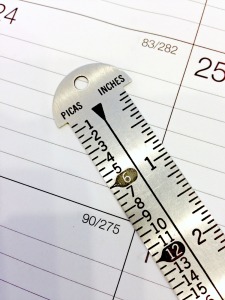Reporters are among the last remnants of old-time newspapering that haven’t been replaced by technology yet.
But they’re working on it.
 When we moved from typewriters to computers, it was a great thing for the newsroom. Not so good for the paste-up department, where pink slips were handed out. (At least they didn’t email termination notices in those days.)
When we moved from typewriters to computers, it was a great thing for the newsroom. Not so good for the paste-up department, where pink slips were handed out. (At least they didn’t email termination notices in those days.)
The presses are gradually being replaced by online distribution. Darkrooms, where some of us inhaled enough toxic fumes to warrant our own environmental impact statement, gave way to digital cameras.
How many people are still around who have a pica pole in the drawer? I do.
Copy editors … well, they weren’t replaced. They just got rid of most of them. Sure, we have spell-check, but that’s no substitute for a grumpy desk editor hollering across the newsroom to let everybody — especially you — know he just kept your latest moronic mistake out of tomorrow’s edition.
Now, we just go ahead and write, hit ‘publish’ and wait for somebody to correct us in the Comments section.
Today on Science Friday, I listened to some guys talk about the most recent efforts to have bots write news stories. And books.
Most of you know that Associated Press uses a bot program to regurgitate routine financial reports. And sports stories can be written by formula, though you might as well just read the box score.
New to me, however, was Mark Riedl’s Scheherazade program, through which he’s attempting to perfect an algorithm for creative writing.
The example is both bad and good. Here’s a piece:
With sweaty palms and heart racing, John drove to Sally’s house for their first date. Sally, her pretty white dress flowing in the wind, carefully entered John’s car. John and Sally drove to the movie theatre. John and Sally parked the car in the parking lot.
So the writing is weak. It doesn’t flow, there’s no particular insight or turn of phrase. It reads like it was written by a fifth-grader who is going to be satisfied with a ‘B’ on her English assignment.
On the other hand, I think a fifth-grade ‘B’ is an astonishing accomplishment for a machine that can’t think on its own.
I mean, holy crap.
When I consider how far this whole process has come in 20 years, I must assume the next 20 years is going to bring about advances of which I’ve not yet dreamed.
Will the bots be able not only to replicate the process, but to create? And when the copy editor screams across the newsroom, will he make a sound?
 Nevada Press Association The best in Nevada journalism since 1924
Nevada Press Association The best in Nevada journalism since 1924
